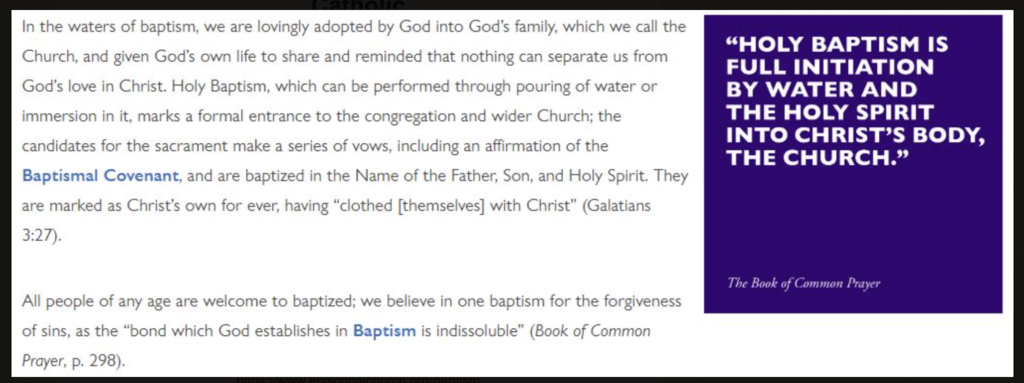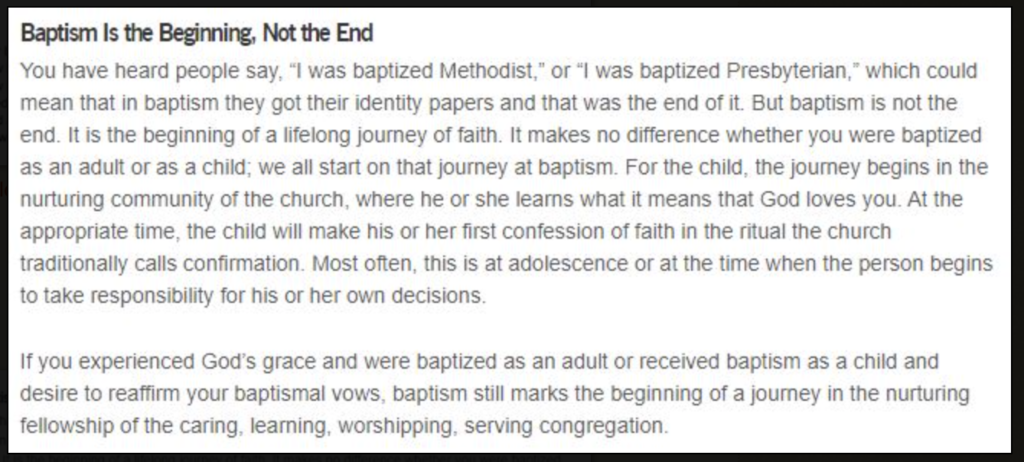Introduction
When I was received into the Catholic Church in 2011, it was after a few months of weekly meetings in a membership class on Catholic theology and practice, preparation for and reception of the sacrament of reconciliation (confession), and presentation of documentation of my April 15, 1951, baptism at the First Baptist Church, Maryville, TN. I had been eight years old and had “walked the aisle” on March 30, 1951, in response to the traditional Baptist end-of-service invitational hymn, probably on the first or second of the unknown number of verses of “Just as I Am,” and confessed faith in Jesus as my savior and asked to be baptized and received into the church. That simple process is a key element of Baptist “liturgy.”
To be asked to provide that ancient history was a bit surprising to me at the time because I knew that the baptismal practices of Catholics and Baptists were quite different, and that my former Baptist church would have required re-baptism of former Catholics wanting to become Baptist. Here are brief summaries of the key beliefs of the two.
Baptist Baptism
- Only for “believers” who have reached the “age of accountability” and “made a decision” for Christ
- By total immersion in water
- An act of obedience and testimony by the believer
- Symbolizes the death, burial, and resurrection of Jesus and the believer’s death to sin, burial, and resurrection to new life in Christ.
- May be repeated if some new level of commitment or conversion is reached or if the baptized person feels his or her conversion at the initial baptism was not sincere (enough).
Catholic Baptism
- For any who have never been baptized and desire entry into the Church, the Body of Christ, following a period of instruction about the
faith. - For the children, even infants, of Baptized and Confirmed believers who promise, in faith, to instruct and raise those children and infants in the
faith of the Church. Full membership in the Body of Christ requires Christian Education and the Sacrament of Confirmation at an accountable age. - Immersion is fine but not required. Baptism must be by water, with right intent, in the name of the Father, the Son, and the Holy Spirit.
- An act of Grace by the Triune God, Father, Son, and Holy Spirit, through which the baptized are freed from sin and reborn as sons of God.
- Done once only since the effectiveness depends only on the Grace of God and not on the person baptized or the person doing the baptizing. To doubt is an expression of lack of faith. (Baptism done by force, with wrong intent, in some name other than that of the Father, Son, and Holy Spirit, or in lemonade or beer instead of water, is not considered valid. Throughout Sacred Scripture, washing with water is always a symbol of cleaning and removal of sin.)
Reconciling the Two
I have never doubted the validity or sincerity of that innocent and childlike “conversion” and baptism I experienced at age 8 in the Baptist Church, but I have learned that conversion is not a “once and done” thing but a life-long process of learning and serving, examining and confessing, and increasing commitment, a process that I have observed both Baptists and Catholics experiencing.
I remember an insightful statement by a Lutheran seminary professor: “Don’t be concerned about whether you have crossed some imaginary or subjective line. Just focus on making progress in the right direction.”
To oversimplify a bit, I would say that the line to be crossed is key in Baptist theology while Catholic theology focuses more on continually moving in the right direction toward the holiness commanded by Jesus. I suppose that is why Catholics are accused by the “faith alone” adherents of “works righteousness.” Well, anyone familiar with the New Testament will know of lots of uses of such imperatives as study, work, endure, persist, fight, finish, etc. as well as to instances of failure or falling away by believers. And all those “works” can be done in perfect (or even imperfect) faith.
- Baptism is important
- We are saved by grace through faith and it is not from us but is a gift of God. (Ephesians 2:8)
Catholics just see more complications and more divine mystery in the underlying processes and identify even whatever good works we may do as not of ourselves but as gifts of God.
What About Those Other “Denominations?”
And then there are the Orthodox, Episcopal, Lutheran, Methodist, Presbyterian, Church of God, etc. understandings of Baptism. Below are some official statements from church websites. At most of the links there is much more explanation than the simple screen shots I have posted. Since the screen shots are difficult to read, I have typed the words between the names of the denominations and the screen shots. Clicking on the screen shots with make them a bit clearer not not clear enough!
Southern Baptist



Orthodox

Lutheran (ELCA)

Methodist

